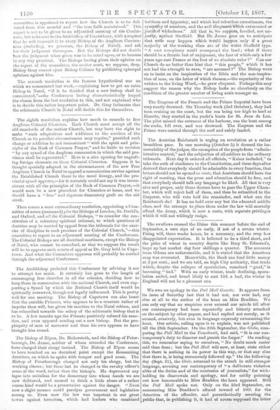The Bishop of Ripon, Dr. Bickersteth, and the Bishop of
Peter- borough, Dr. Jeune, neither of whom attended the Conference, have charged their clergy instead. The Bishop of Ripon seems to have touched on no doctrinal point except the Romanizing doctrines, on which he spoke with temper and good sense. The Bishop of Peterborough charged not only his clergy, but the working classes ; but these last he charged in the cavalry officer's sense of the word, rather than the bishop's. He deprecated any lapse into socialism for the democracy into whose hands we are now delivered, and seemed to think a little abuse of a rather coarse kind would be a preservative against the danger. "Even now a slight tmenace could paralyze government and legislation among us. Even now the law was impotent in our great towns against terrorism, which had leaders who combined boldness and hypocrisy, and which had relentless executioners, the sympathy of numbers, and the evil eloquence which extenuated or justiflA wickedness." All that is, we suppose, levelled, not un- justly, against Sheffield. But Dr. Jenne goes on to anticipate that evils may happen which Wcittld happen only if a great majority of the working class are of the worst Sheffield type. "A vast conspiracy could overspread the land ; what if there should be a frantic lust of enjoyment, the fear of which only a few years ago cast France at the foot of an absolute ruler ?" Can our Church do no better than hint that "this people," which it has not had the strength to save, "are accursed ?" The Bishop went on to insist on the inspiration of the Bible and the non-inspira- tion of man, on the latter of which themes,--the superiority of the written to the living Word,—he grew eloquent. Perhaps this may suggest the reason why the Bishop looks so cheerlessly on the condition of the greater number of living souls amongst us.






























 Previous page
Previous page